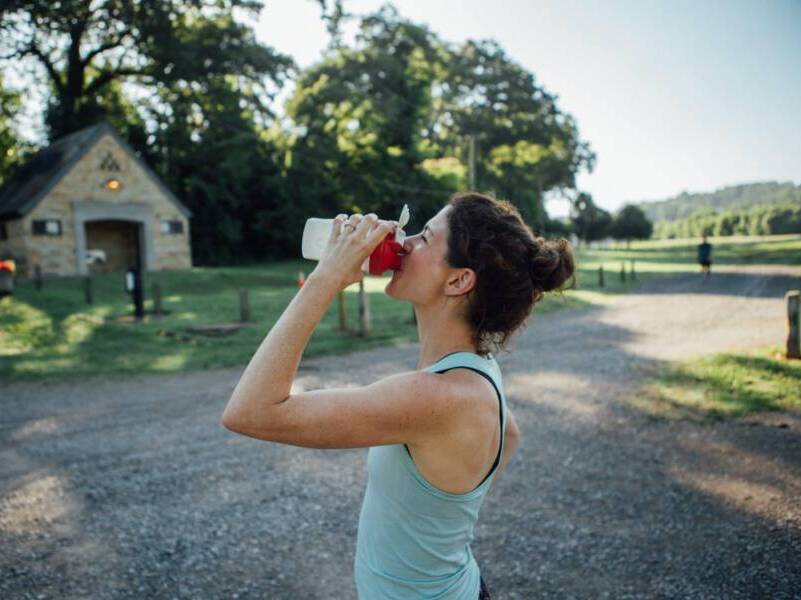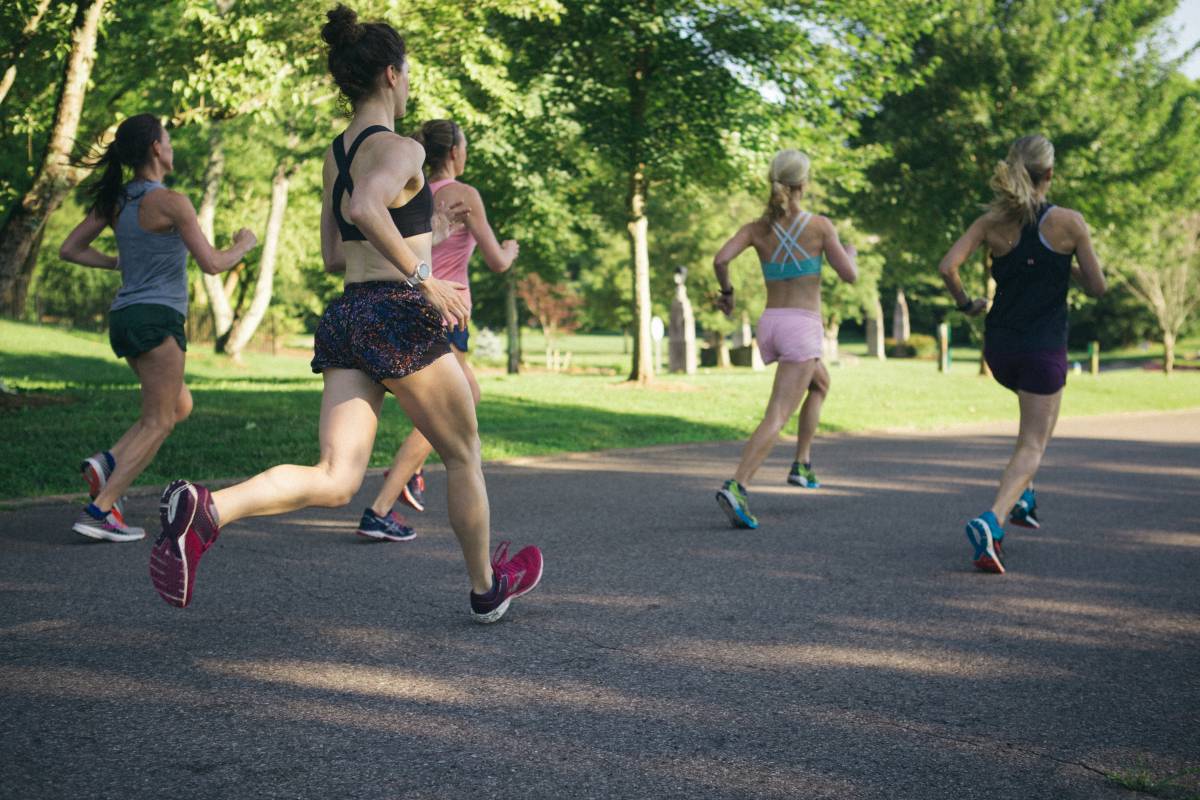Hydration for Runners: An RD’s Complete Guide
Hydration for runners running long distances is so important for performance and proper biological functioning. But it can be downright confusing how much fluids and electrolytes you need. Getting too much or too little can be harmful to your health!

I admit that I haven’t prioritized my hydration for running in the past. It’s been an afterthought of relying on finding water fountains along my route. But several bad runs where I was thirsty and dehydrated fixed that. Not only did running feel terrible during but afterward I got headaches, nausea and felt dizzy and week. Now, I plan my hydration for running–drinking fluids before, during, and after running.
Table of contents
If carrying your fluids on your runs is part of the problem for you (like it was for me), check out my article on how to carry water on your runs!
Having adequate hydration is important because your body uses water from your blood for sweat to cool your body. If your blood doesn’t have enough water, it gets thicker, and can’t get oxygen to your muscles as fast—causing you to slow down. If you don’t have enough water to sweat, then you can overheat which can be life-threatening.
Along with water, you need electrolytes. Electrolytes are a key component for hydration because they help regulate your body’s fluid balance allowing your muscles to retain the right amount so they can operate properly. But like with everything—you can have too much of a good thing. Drinking too much fluids can upset your stomach and taking in too many electrolytes while running can be harmful to your health — and even fatal.
I figured out my hydration for running plan by talking with registered sports dietitians Megan Robinson and Amy Stephens. I am sharing what they shared with me below so you can hydrate to run your best! (If you’re curious about my whole fueling plan, check out how I fueled by 2:54 marathon which includes my favorite energy gels for runners.
General Hydration Plan for Running
Use this hydration plan for runners as a guide but not a rule, noting you may need more or less depending on the factors listed below.
- Before your run: Two hours before your run, aim to drink 16 to 18 ounces. Four hours before your run, shoot for 16 to 24 ounces of water. Aim to drink at least 400 mg of electrolytes (mostly sodium) in these fluids.
- During your run: Aim for 2 to 5 ounces of fluid (or two big gulps) every 10 minutes of running. Shoot for 400 mg of sodium an hour
- After your run: Ideally, you will have weighed yourself before your run (and before you hydrated) to know your pre-run weight. Aim to drink 16-24 ounces per pound of body weight lost. Aim for at least 400 mg of sodium after your run.
Factors affecting how much fluids and electrolytes you need include:
- Air temperature (hot, you need more)
- Humidity (high, you need more)
- Run duration (longer, you need more)
- Run intensity (harder, you need more)
- Sweat rate (high, you need more)
- Altitude (high, you need more)
- Fitness level (low, you need more)
- Genetics, and
- Clothing (more, you need more)
Seeing as the duration of a run and the weather are big factors, here are some hydration tips for runners depending on the length and heat.
Hydration Guide for Different Types of Runs
Here is your time-based hydration guide for runners based on how long you are running.
Easy runs in under an hour. No need to consume more electrolytes or water than usual on shorter runs. It’s always a good idea to stay hydrated and eat a balanced diet. You can have a sports drink with breakfast or add some salt to your toast.
Runs lasting 1 to 3 hours. Aim to drink about 16 ounces of fluid with about 400 up to 1,000 of sodium before your longer runs depending on the elements and intensity. Aim to intake about 400 mg of sodium an hour of exercise. If you eat a balanced diet, you don’t need to focus on taking in potassium, magnesium, or chloride. The sports drinks will have those electrolytes as well. Aim to drink 2 to 5 ounces of fluid every 10 minutes (or every mile).
Runs more 3+ hours. Continue to take in 400 mg of sodium an hour of running and 2-5 ounces of fluid every ten minutes. If your effort is intense, you may need more but your stomach may not be able to handle it. Salt tablets like SI Caps can come in handy during this time.
Post-run. After your runs, intake recovery drinks or electrolyte drinks to make up the the weight you lost—about 16 ounces per pound plus water. You can also stick with water and eat salty foods including pizza and chips. Add salt or take electrolyte tablets.
Hydration Tips for Running in Hot Weather
Drink early and often.
Drink an electrolyte drink before your run. And, then keep it up, especially for runs lasting longer than an hour. Sip on a sports drink throughout. Ideally, you will be drinking up to 16 ounces an hour during your run.
Plan your electrolytes.
You want to take in about 400 electrolytes an hour. So do the math before your training run or race: How many electrolytes are in your energy gels? How many are in your sports drink? Do you need to supplement with salt tabs?
Experiment with what combination works best for you during your training. Bear in mind that while you will want to aim to hit 400 mg an hour of sodium—you may need a bit or less.
Weigh yourself.
Be sure to weigh yourself before and after your runs to get an idea of what your hydration and electrolyte needs are. This will help you figure out how many bottles and how many milligrams of salt you need per hour of running. This will also help you rehydrate appropriately, helping you recover faster from your runs. So, when you get in the door. Weigh yourself and then start drinking!
Plan ahead.
Think about how you will carry your hydration on your training runs and during race day. Some people like hydration packs or hydration vests. Others prefer to carry two handheld water bottles.I stash my bottles along my running route. On race day, I use the race’s water stops. This is because I do not like carrying things—especially when running at an intense effort.
Don’t go overboard.
You can over-hydrate and have too many electrolytes. Overhydrating can be deadly. And having too many electrolytes can wreak havoc your stomach. So, if you take salt tabs, for example, drink water with them!
Thus, nailing your hydration for running may be a performance-enhancer but it can also be a lifesaver!
How many electrolytes should I drink while running?
A runner’s hydration plan needs to include both water or fluids and electrolytes. Electrolytes are minerals in your body that have an electric charge found in your blood, urine, tissues, and other body fluids. They help with functions such as nerve signaling and muscle contractions (so obviously, very important for running!). This is why the above hydration plans for running talk about both fluids and electrolytes. I want to share just a little bit more background on electrolytes because runners will often only think they need to drink water.
In an hour of running, the average person loses about:
- 800-1,000 mg of sodium
- 195 mg of potassium
- 20 mg of calcium, and
- 10 mg of magnesium per hour
It’s recommended that runners aim to replace about 50 to 80 percent of those losses while running for runs lasting longer than an hour. So, if you are running for two hours, aim to intake a total of 400 mg of sodium, about 200 mg of calcium, 20 mg of calcium, and 10 mg of magnesium.
Considering the average sports drink like Gatorade has about 200 mg of sodium, that would mean you need to drink two sports drinks an hour. Other options include drinking a hydration mix with a higher electrolyte content or using salt tabs. Get my list of the best electrolyte drinks for runners here.
You can tell if you are getting enough electrolytes and fluids while running if you don’t experience symptoms such as cramping or nausea. But, remember your needs will vary based on variables such as weather, altitude, and workout intensity.
I hope this hydration plan for running helps you stay safe AND improve your running performance. Do you plan out your hydration before runs?






